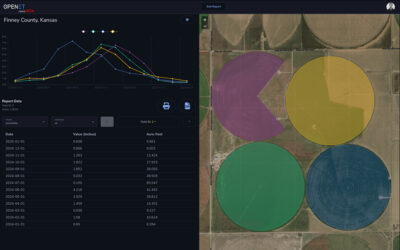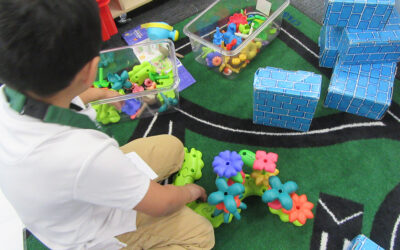The project will receive additional funding through the Bipartisan Infrastructure Law to test, scale up, and transfer knowledge to build national adaptation to floods and wildfires
Reno, Nev. (October 02, 2023) – DRI is leading the way in building regional climate resiliency through the California-Nevada Adaptation Program, which will prepare communities for local-level action to address climate hazards including extreme heat and wildfire smoke, water scarcity, and coastal flooding. One of several regional NOAA Climate Adaptation Partnerships, CNAP is led by DRI’s Tamara Wall, Ph.D., through a partnership with Scripps Institute of Oceanography.
Following a $5 million award earlier this year for the next 5 years of the program, the project will receive additional funding from NOAA and the Department of Commerce to work with the University of Washington for a regional comparison of how social infrastructure influences a community’s vulnerability to extreme heat and wildfire smoke. The lead on this particular project is Kristin VanderMolen, Ph.D., DRI assistant research professor of atmospheric science.
“This funding will enable CNAP researchers to further expand our research and community engagement focused on the impacts of extreme heat and wildfire smoke on households in Northern Nevada, while expanding our research with colleagues from the University of Washington and working with community-based organizations in the Northwest,” says Wall, DRI research professor of atmospheric science.
Below is the full press release from NOAA and the Department of Commerce.
Biden-Harris Administration invests $3.9 million for flooding and wildfire resilience through Investing in America agenda
Funding will support NOAA effort to strengthen climate adaptation
Today, the Department of Commerce and NOAA announced that $3.9 million in funding from the Bipartisan Infrastructure Law will be awarded over four years to existing NOAA Climate Adaptation Partnerships (CAP) / Regional Integrated Sciences and Assessments (RISA) teams and expansion activity regions. The funding will be used to test, scale up and transfer knowledge to build national adaptation to floods and wildfires.
According to the latest figures from NOAA’s National Centers for Environmental Information, the U.S. has sustained 371 separate billion-dollar weather and climate disasters since 1980, including 42 flooding events and 22 wildfires. These new funds will enable NOAA to help communities build adaptive capacity to coastal and inland flooding and wildfire risk across many U.S. regions, including the continental U.S., Hawai’i, Puerto Rico and the U.S. Virgin Islands.
“NOAA’s Climate Adaptation Partnerships program strengthens connections among municipal planners, resource managers, businesses and policy leaders seeking to use the best available science and local expertise to help communities address climate-related risks for resilient economic growth,“ said U.S. Secretary of Commerce Gina Raimondo. “This investment, which is part of President Biden’s Investing in America agenda –a key pillar of Bidenomics – enables communities to share lessons across geographies to promote even more climate-smart economic growth.”
Awarded projects include:
● Improving engagement methods for coastal resilience planning: The funded projects will evaluate and improve engagement methods with coastal communities that help them plan for flooding and inundation to support comprehensive planning activities for coastal climate resilience and implementable climate adaptation solutions to flooding and inundation.
○ Stories as science: Integrating lived experience and community knowledge into actionable adaptation science in Pacific Northwest and Pacific Islands regions. ($499,183 to University of Washington, Arizona State University).
○ Improving engagement methods with communities for coastal resilience and reducing climate risk: Bridging learning networks in the Urban Northeast and U.S. Caribbean regions ($499,836 to Worcester Polytechnic Institute, Drexel University, University of the Virgin Islands, Foundation for Puerto Rico).
● Assessing tradeoffs and co-benefits for complex decision-making in communities facing coastal inundation and/or inland flooding: The funded projects will develop new or improved approaches for identifying and assessing tradeoffs and co-benefits of
flood mitigation infrastructure options in communities affected by coastal inundation and/or inland flooding.
○ Enabling equitable adaptation to changing coastal flood risks through community-engaged modeling in the Carolinas and Pacific Islands regions ($486,933 to University of North Carolina at Chapel Hill, North Carolina State University, Core Sound Waterfowl Museum and Heritage Center, The Museum of Life and Science, University of Hawai’i).
○ Co-developing a decision-support framework for adaptation to coastal flooding: A comparative case study of communities in the Urban Northeast and Mid-Atlantic regions ($486,990 to Columbia University, Stevens Institute of Technology, Virginia Institute for Marine Science, Shinnecock Nation).
○ Incorporating principles of environmental justice into forecast-informed water reservoir operations: A climate and flood adaptation strategy in the West and Southeast regions ($474,343 to University of California San Diego, University of Georgia).
○ Coast to coast: Using scenario planning to build resilience to compound flooding in the Great Lakes and Southeast regions ($474,554 to University of Michigan, University of Georgia).
● Identifying complex interactions between social infrastructure and wildfire risks to improve community adaptive capacity: The funded projects will advance actionable knowledge of the interactions between wildfire risk and social infrastructures in order to develop relevant solutions to improve climate resilience and reduce wildfire risk in frontline communities.
○ Understanding the role of social infrastructure in extreme heat and wildfire smoke vulnerability mitigation: A regional comparison in the West and Pacific Northwest regions ($474,859 to Desert Research Institute, University of Washington).
○ Health and social services in the long-term wildfire recovery of rural communities in the Southwest and Intermountain West regions ($473,798 to University of Arizona, University of Colorado Boulder).
The NOAA CAP/RISA program is an applied research and engagement program that expands society’s regional capacity to adapt to climate impacts in the U.S. CAP/RISA supports sustained, collaborative relationships that help communities build lasting and equitable climate resilience. Funded by five-year cooperative agreements with NOAA, the work is accomplished by teams of research institutions, nonprofit organizations, and state, local and Tribal governments in multi-state regions.
More information: https://www.dri.edu/cnap/
###
About DRI
The Desert Research Institute (DRI) is a recognized world leader in basic and applied environmental research. Committed to scientific excellence and integrity, DRI faculty, students who work alongside them, and staff have developed scientific knowledge and innovative technologies in research projects around the globe. Since 1959, DRI’s research has advanced scientific knowledge on topics ranging from humans’ impact on the environment to the environment’s impact on humans. DRI’s impactful science and inspiring solutions support Nevada’s diverse economy, provide science-based educational opportunities, and inform policymakers, business leaders, and community members. With campuses in Las Vegas and Reno, DRI serves as the non-profit research arm of the Nevada System of Higher Education. For more information, please visit www.dri.edu.
Media Contact:
Elyse DeFranco
Science Writer, DRI
E: elyse.defranco@dri.edu


